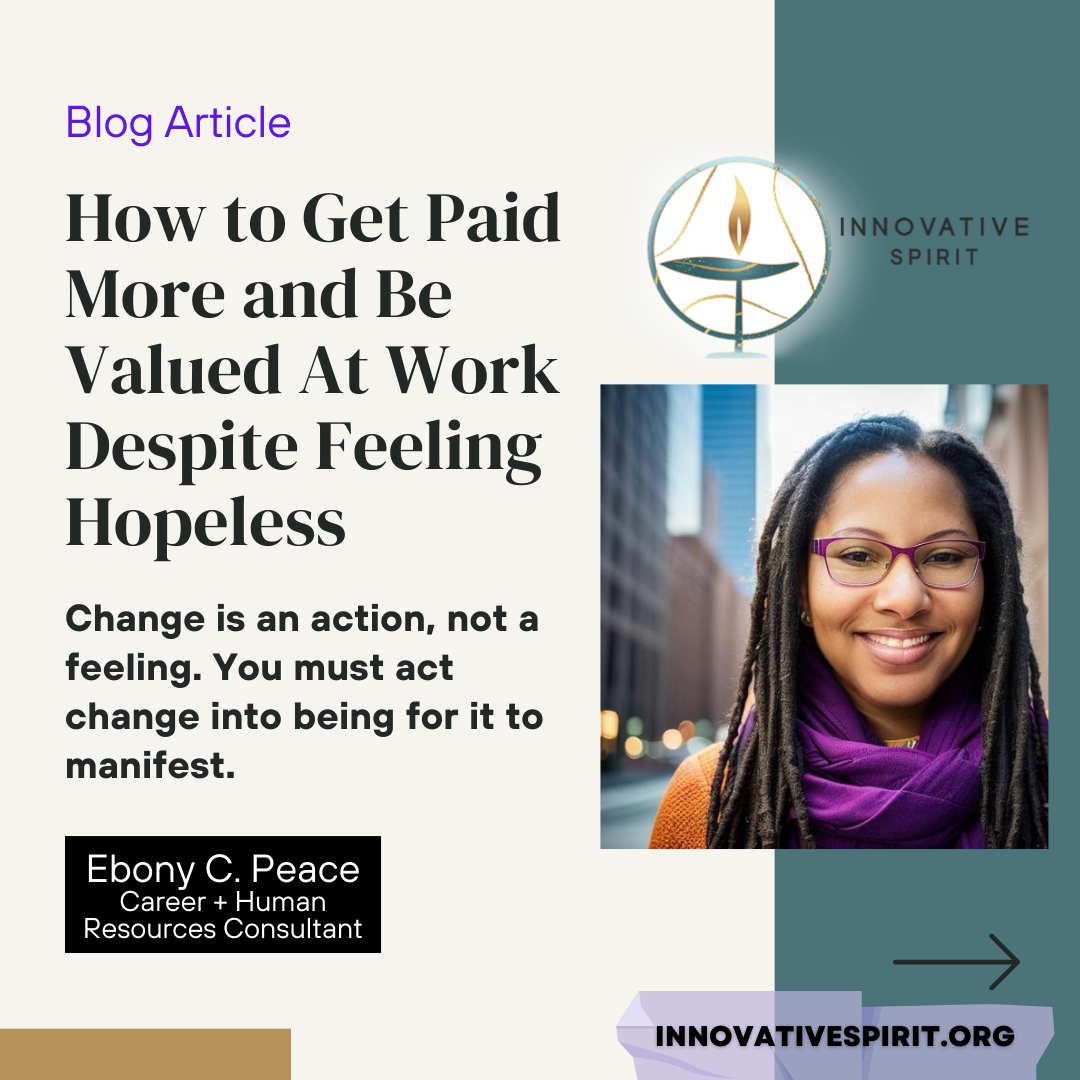How to Get Paid More and Be Valued At Work Despite Feeling Hopeless
- Posted on Jan 26, 2024

Imagine being stuck in a job where you’re underpaid, underappreciated, and undervalued. This circumstance is the opposite of #careerwellness. It’s a reality many of us face, but it doesn’t have to be. The longer we accept being underpaid, the more we convince ourselves that it’s all we deserve. We become comfortable with not being valued and appreciated, and this acceptance seeps into our subconscious, convincing us that we are worth less than we truly are. In my field of sociological practice, we call this process wherein individuals base their sense of self on how they believe others view them, the looking glass self.”
In my career consulting practice, I work primarily with individuals who identify as members of historically marginalized groups. People of color, women, LGBTQ+, low-income individuals, justice-involved individuals, people with disabilities, and folks with unconventional occupations tend to have significantly more work-related trauma than the average person. They’re not just underpaid, they’re often mistreated, and their confidence repeatedly shattered. They feel stuck, believing they can’t do better. But they can. And so can you.

First, don’t blame your company for taking advantage of you. Instead, take control. Ask for that raise. Show them why you deserve it. If they refuse, remember, it’s within your power to find a better paying job.
It’s one thing for an organization to underpay you when either they’re not aware or you didn’t ask. It’s another when they are fully aware of the inequity and refuse make it right. In a perfect world you shouldn’t have to ask, and we both know this world is not perfect. So ask, even though you shouldn’t have to. Take action for change even when the outcome is uncertain.
But here’s the truth – there are workplaces out there that value you, that pay equitably, and where leaders are eager to go out of their way to demonstrate that they appreciate you. I know this because I work with such organizations, regularly. They reach out to me to help them create or strengthen their inclusive workplace cultures and deepen their employee engagement so everyone feels like they belong and are valued.
I’ve been in this field for over 20 years, and what I find most interesting is that those who are most mistreated at work find it hardest to leave. Doesn’t it sound counter intuitive, though? I didn’t realize this until I stepped back from the details to analyze an overview of the situations many of my career consulting clients were experiencing. You would think those who have been mistreated the most would be the first to jump ship, but that’s just not the case. Instead, they are the first to want to leave, but are also the most afraid or disheartened to actually try.
When I share with my clients in this situation that there are workplaces out there with inclusive workplace cultures who value their employees – they find it hard to believe. Why? Partly, I believe because they have been gaslit and otherwise caused to second guess themselves for so long that their sense of reality has shifted. This seems to result in them acting or (not acting) out of fearful and pessimism. In contrast, I have observed that my happiest and most confident clients find career transitioning to be easier and more exciting.
Second, move forward even when you don’t feel like moving. Your mind and body may not be aligned, but follow your heart. It takes courage to exit an abusive situation, workplace or otherwise. It takes faith to believe in the possibilities when your daily work experience feels impossible to endure. It takes strength to take action for change, when you feel helpless and that the outcome of trying is uncertain.
If you’re in a similar situation, you’re not stuck. You’re just not in enough pain to make the changes you need. Or perhaps you’re afraid. But remember, there’s a better future out there waiting for you. They key is to believe in possibilities despite what you’re feeling.
Third, stop trying to dig yourself out and instead, ask for help. This is where my sociological perspective comes into play in the work that I do with individuals and with organizations. For example, there’s a saying that, “love is an action, not a feeling.” My sociological perspective is that this same concept applies for “change”. I believe that feeling strongly will not facilitate change in your life and career; you must act change into being for it to manifest. Acting when you don’t feel it, is tough. I know. Keep in mind that you don’t have to act alone. I’m here to support you in your next career transition if you need someone to reach out to.
If you know someone who needs to hear this, please share it with them. If this resonates with you, send me a DM. I’d love to connect.
You’ve got this!
#Courage #Change #Possibilities #lovecareerfreedom #careerwellness
***
💜 𝗜 𝗮𝗺 𝗘𝗯𝗼𝗻𝘆 𝗖. 𝗣𝗲𝗮𝗰𝗲
🔑 Helping organizations advance their goals of an inclusive workplace culture and an engaged workforce
http://tinyurl.com/597n7h5u – 𝗧𝗵𝗲 𝗖𝗵𝗼𝗶𝗰𝗲 𝘁𝗼 𝗟𝗼𝘃𝗲: 𝗖𝗮𝗿𝗲𝗲𝗿 𝗦𝗲𝗹𝗳-𝗰𝗮𝗿𝗲 𝗳𝗼𝗿 𝗙𝗶𝗻𝗮𝗻𝗰𝗶𝗮𝗹 𝗙𝗿𝗲𝗲𝗱𝗼𝗺 http://tinyurl.com/5c3fxftv – 𝗧𝗵𝗲 𝗚𝗲𝘁 𝗔 𝗥𝗲𝗺𝗼𝘁𝗲 𝗝𝗼𝗯 𝗕𝗹𝘂𝗲𝗽𝗿𝗶𝗻𝘁
🌸 ►Schedule a consultation for HR & Advisory services: https://tinyurl.com/mryysekw
🌸►Schedule a free career strategy chat about your individual goals: https://tinyurl.com/2zkupvme
🔥⭐ 𝗚𝗲𝘁 𝗶𝗻𝘀𝘁𝗮𝗻𝘁 𝗮𝗰𝗰𝗲𝘀𝘀 𝘁𝗼 𝗺𝘆 𝗙𝗿𝗲𝗲 𝗚𝗶𝗳𝘁 𝗩𝗮𝘂𝗹𝘁 ➡️ https://mailchi.mp/9b09c50c8be4/gifts. Training videos, mini-workshops, and more!
💜 Innovativespirit.org💜
